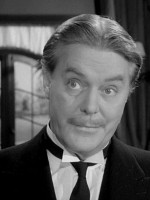John H. Watson

- Infos
- Photos
- Best films
If you like this character, let us know!
John H. Watson, known as Dr. Watson, is a fictional character in the Sherlock Holmes stories by Sir Arthur Conan Doyle. Watson is Sherlock Holmes' friend, assistant and sometime flatmate, and the first person narrator of all but four of these stories. He is described as the typical Victorian-era gentleman, unlike the more eccentric Holmes. He is astute, although he can never match his friend's deductive skills.Watson has been adapted in various films, television series, video games, comics, and radio, retaining his role as Holmes' friend and confidant.
Biography
Dr. Watson's first name is mentioned on only four occasions. Part one of the very first Sherlock Holmes story, A Study in Scarlet, is subtitled Being a reprint from the Reminiscences of John H. Watson, M.D., Late of the Army Medical Department. The preface of the collection His Last Bow is signed 'John H. Watson, M.D', and in "The Problem of Thor Bridge", Watson says that his dispatch box is labeled 'John H. Watson, M.D'. His wife Mary Watson calls him 'James' in "The Man with the Twisted Lip"; Dorothy L. Sayers speculates that Mary may be referring to his middle name Hamish (an Anglicisation of 'Sheumais', the vocative form of 'Seumas', the Scottish Gaelic for James), though Doyle himself never addresses this beyond including the initial.In A Study in Scarlet, Watson, as the narrator, establishes having received his medical degree from Barts and The London School of Medicine and Dentistry, the University of London in 1878, and subsequently being trained at Netley as an assistant surgeon in the British Army. (In a non-canonical story, "The Field Bazaar", Watson is described as having received his Bachelor of Medicine from Doyle's alma mater, Edinburgh University; this would likely have been in 1874.) He joined British forces in India with the 5th Northumberland Fusiliers before being attached to the 66th (Berkshire) Regiment of Foot, saw service in the Second Anglo-Afghan War, was wounded at the Battle of Maiwand (July 1880) by a Jezail bullet in the shoulder, suffered enteric fever and was sent back to England on the troopship HMS Orontes following his recovery. With his health ruined, he was then given a monthly pension of 11 shillings/9 pence for 9 months.
In 1881, Watson is introduced by his friend Stamford to Sherlock Holmes, who is looking for someone to share rent at a flat in 221B Baker Street. Concluding that they are compatible, they subsequently move into the flat. When Watson notices multiple eccentric guests frequenting the flat, Holmes reveals that he is a "consulting detective" and that the guests are his clients.
Watson witnesses Holmes' skills of deduction on their first case together, concerning a series of murders related to Mormon intrigue. When the case is solved, Watson is angered that Holmes is not given any credit for it by the press. When Holmes refuses to record and publish his account of the adventure, Watson endeavours to do so himself. In time, Holmes and Watson become close friends.
In The Sign of the Four, John Watson becomes engaged to Mary Morstan, a governess. In "The Adventure of the Empty House", statements by Watson imply that Morstan has died by the time Holmes returns after faking his death; that fact is confirmed when Watson moves back to Baker Street to share lodgings with Holmes. Conan Doyle mentioned another wife in The Adventure of the Blanched Soldier (set in January 1903), but this wife was never named or described.
At the beginning of A Study in Scarlet, Watson states he had "neither kith nor kin in England". In the Sign of the Four, it is established his father and older brother are deceased, and both shared the initial 'H', when Holmes examines an old watch in Watson's possession, formerly his father's before inherited by his brother. Holmes estimates the watch to have a value of 50 guineas, so H. Watson, Sr., was a very prosperous man if he could have afforded such an item. Holmes deduced from the watch that Watson's brother was "a man of untidy habits—very untidy and careless. He was left with good prospects but threw away his chances, lived for sometime in poverty with occasional short intervals of prosperity and finally, taking to drink he died."
Watson as Holmes' biographer
Throughout Doyle's novels, Watson is presented as Holmes' biographer. At the end of the first published Holmes story, A Study in Scarlet, Watson is so incensed by Scotland Yard's claiming full credit for its solution that he exclaims: "Your merits should be publicly recognised. You should publish an account of the case. If you won't, I will for you". Holmes suavely responds: "You may do what you like, Doctor". Therefore, the story is presented as "a reprint from the reminiscences of John H. Watson", and most other stories of the series share this by implication.
In the first chapter of The Sign of Four, Holmes comments on Watson's first effort as a biographer: "I glanced over it. Honestly, I cannot congratulate you upon it. Detection is, or ought to be, an exact science and should be treated in the same cold and unemotional manner. You have attempted to tinge it with romanticism... The only point in the case which deserved mention was the curious analytical reasoning from effects to causes, by which I succeeded in unravelling it"; whereupon Watson admits, "I was annoyed at this criticism of a work which had been specially designed to please him. I confess, too, that I was irritated by the egotism which seemed to demand that every line of my pamphlet should be devoted to his own special doings".
In "Silver Blaze", Holmes confesses: "I made a blunder, my dear Watson—which is, I am afraid, a more common occurrence than anyone would think who only knew me through your memoirs"; and in The Hound of the Baskervilles, chapters 5–6, Holmes says: "Watson, Watson, if you are an honest man you will record this also and set it against my successes!"; whereas in his prologue to "The Adventure of the Yellow Face," Watson himself remarked: "In publishing these short sketches [of Holmes’ cases]...it is only natural that I should dwell rather upon his successes than upon his failures", on grounds that where Holmes failed, often nobody else succeeded.
Sometimes Watson (and through him, Conan Doyle) seems determined to stop publishing stories about Holmes: in "The Adventure of the Second Stain", Watson declares that he had intended the previous story (“The Adventure of the Abbey Grange”) "to be the last of those exploits of my friend, Mr. Sherlock Holmes, which I should ever communicate to the public", but later decided that "this long series of episodes should culminate in the most important international case which he has ever been called upon to handle" ("The Second Stain" being that case). Despite this, it was succeeded by 20 other stories.
In the later stories, written after Holmes' retirement (c. 1903–04), Watson repeatedly refers to "notes of many hundreds of cases to which I have never alluded”, on grounds that after Holmes' retirement, the detective showed reluctance "to the continued publication of his experiences. So long as he was in actual professional practice the records of his successes were of some practical value to him, but since he has definitely retired...notoriety has become hateful to him" ("The Adventure of the Second Stain"). After Holmes' retirement, Watson often cites special permission from his friend for the publication of further stories; but received occasional unsolicited suggestions from Holmes of what stories to tell, as noted at the beginning of "The Adventure of the Devil's Foot".
In "The Adventure of the Blanched Soldier," one of only two stories narrated by Holmes himself, the detective remarks about Watson: "I have often had occasion to point out to him how superficial are his accounts and to accuse him of pandering to popular taste instead of confining himself rigidly to facts and figures"; but the narrative style seldom differs, and Holmes confesses that Watson would have been the better choice to write the story. In any case, Holmes regularly referred to Watson as my "faithful friend and biographer," and once exclaims, "I am lost without my Boswell".
At the beginning of "The Adventure of the Veiled Lodger", Watson makes strong claims about "the discretion and high sense of professional honour" that govern his work as Holmes' biographer, but which do not keep Watson from expressing himself and quoting Holmes with candor of their antagonists and their clients. In "The Red-Headed League," for example, Watson introduces Jabez Wilson: "Our visitor bore every mark of being an average commonplace British tradesman, obese, pompous, and slow"—wearing "a not over-clean black frock-coat".
Best films
Played by the actors
Filmography of John H. Watson (106 films)

The Yellow Face (1921)
Directed by Maurice Elvey
Origin United-kingdom
Genres Crime
Themes Sherlock Holmes films
Actors Hubert Willis, Norma Whalley, Clifford Heatherley
 Connection
Connection






